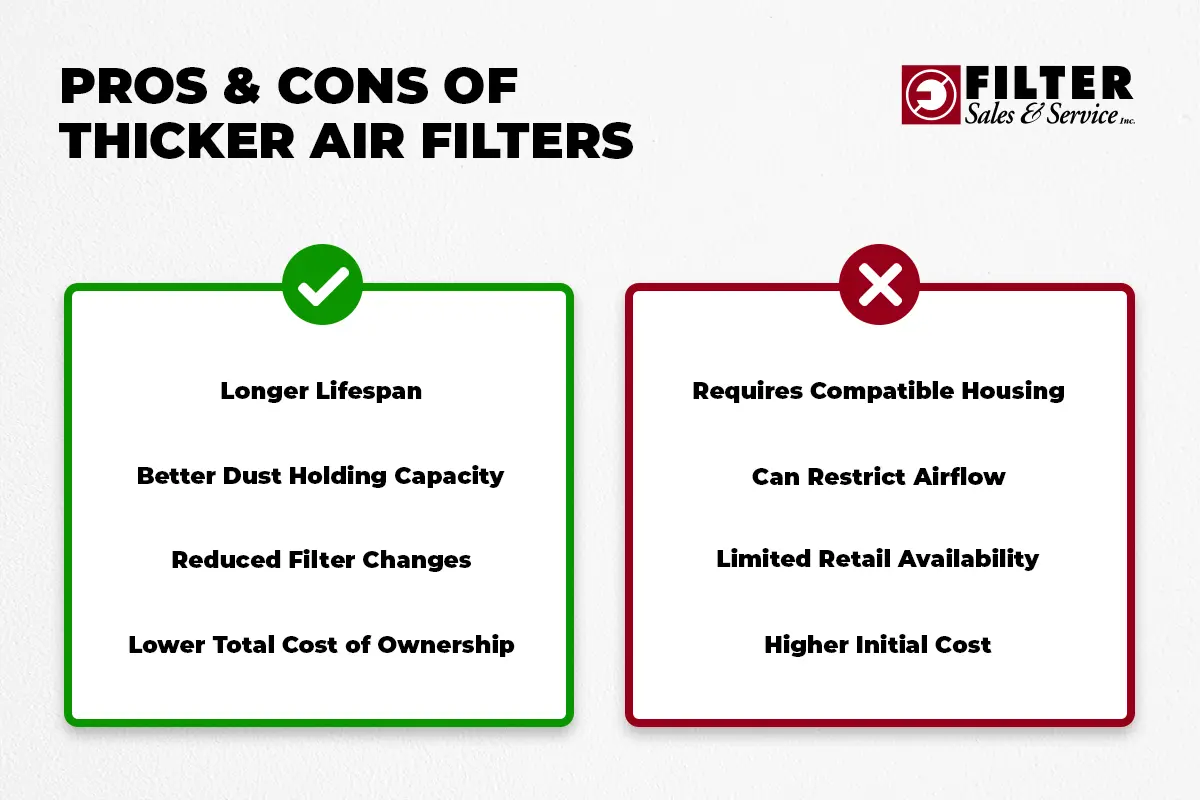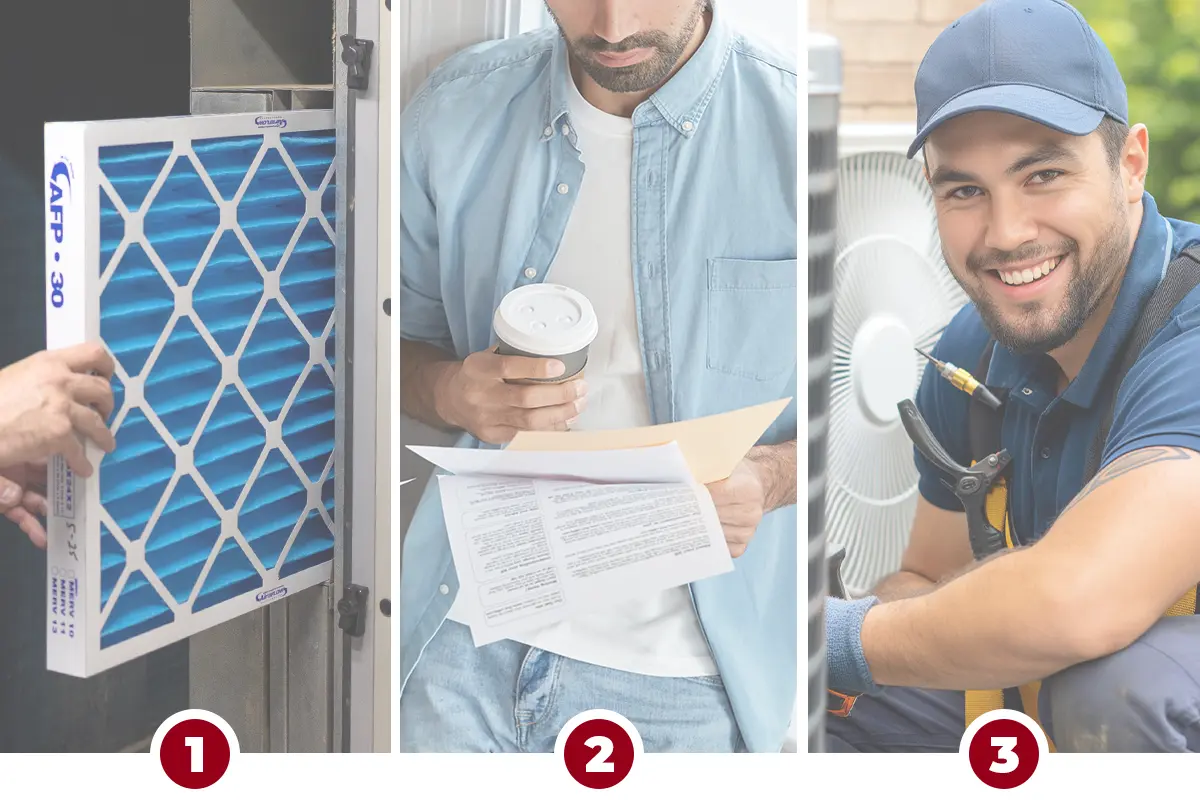Are Thicker Air Filters Better? Key Facts to Consider

Contents
It’s easy to assume a thicker air filter means cleaner air. More depth, more layers, better results. Right? Not necessarily.
While thicker filters can improve performance in the right setup, they can also reduce airflow and put unnecessary strain on your HVAC system. It all depends on how your system is designed and what kind of air quality you're trying to achieve.
Before making the switch from a standard 1-inch filter to something thicker, it’s important to understand what filter thickness actually does, when it helps, and when it could work against you.
What Does "Thicker" Mean in Air Filters?
When people talk about a "thicker" air filter, they are specifically referring to its depth, the measurement from front to back, rather than its height or width.
Thicker filters contain more media, which gives them a larger surface area to trap dust and particles. This extra depth allows the filter to hold more contaminants and often means it will last longer before needing to be replaced.

Standard thicknesses include:
- 1 inch
- 2 inches
- 4 inches
- 5 inches
Consider the comparison between a thin booklet and a full novel. While the booklet might take only an hour to read, the novel could take you a week. The same idea applies to filter thickness. A thinner filter may clog up in just a few months, whereas a thicker filter has enough media to last significantly longer.
However, thicker air filters aren’t universally compatible. Some HVAC systems are specifically designed for 1-inch or 2-inch filters, and using a thicker one can overwork the system and even cause long-term damage.
If you’re considering switching to a thicker filter, always check your system’s specifications to make sure it’s a compatible fit.

Are Thicker Air Filters Better?
The answer is yes... and no.
Thicker air filters can offer important advantages such as longer lifespan and greater dust-holding capacity, but only when your HVAC system is designed to handle them. Simply swapping a 1-inch filter for a 5-inch one doesn’t guarantee better air quality or system performance.
If your system isn’t compatible with thicker filters, using one can strain components, reduce airflow, and even cause damage over time. So while thickness can improve performance, it is important to weigh the pros and cons of different filter depths first.

When Thicker Filters Work Well
In HVAC systems that are designed to handle them, thicker filters can offer several long-term benefits, including:
- Better Dust Holding Capacity: Thicker filters have more surface area allowing them to hold significantly more dust and particles before becoming clogged or requiring replacement.
- Longer Lifespan: Because of their increased capacity and durability, thicker air filters typically last much longer, meaning fewer changes and more consistent performance over time.
- Reduced Filter Changes: With a longer lifespan, thicker filters don’t need to be swapped out as frequently, saving both time and labor throughout the year.
- Lower Total Cost of Ownership: Although they cost more up front, thicker filters often pay off in the long run by reducing replacement frequency and improving energy efficiency when properly matched to your system.
When Thicker Filters Can Cause Problems
Despite their advantages, it's important to remember that thicker filters can create problems if your HVAC system isn’t built to accommodate them:
- Requires Compatible Housing: Thicker filters won’t fit in all HVAC setups and may require a deeper filter slot, custom housing, or modifications to the existing return air grille.
- Can Restrict Airflow: If the filter’s MERV rating is too high or the system isn’t designed for thick filters, it can reduce airflow and increase strain on the blower motor.
- Higher Initial Cost: Thicker air filters generally cost more than their thinner counterparts, which can be a concern for budget-conscious buyers or facilities managing large inventories.
- Limited Retail Availability: Thicker filters, especially in less common sizes, are not always stocked in local stores and may need to be ordered from specialty suppliers or distributors.
For a broader perspective on how filters affect indoor air quality, the U.S. Department of Energy’s Indoor Environmental Quality Assessment Guide offers a helpful overview of system performance, ventilation, and pollutant control.
High-Capacity Filters: A Smarter Option for Tight Spaces
If your system can’t handle a thicker filter, don’t worry. You don’t have to sacrifice performance. High-capacity filters are a smart alternative that deliver many of the same benefits without requiring more space.
These filters are still the standard 1-inch width (or whatever your system calls for), but they’re engineered with more pleats per inch - usually about 1.5 times as many as a regular filter. That means they offer more surface area to trap dust, allergens, and particulates, without increasing airflow resistance.
In other words:
Same size. More pleats. Better performance.
So if you want improve indoor air quality but your system isn’t compatible with thicker filters, a high-capacity model might be the perfect middle ground.
How to Know What’s Right for Your System
Here are three simple steps to help you figure out whether a thicker filter is a good fit, or if you’re better off sticking with a standard 1-inch option:

1. Measure Your Filter Housing
Start by measuring the depth of the filter housing in your air handler. Use a tape measure to get an accurate reading. Don’t rely on the size of the filter that happens to be in place right now.
If the space only accommodates a 1-inch filter, do not attempt to fit in a thicker one. Installing a filter that is too deep can lead to poor airflow, improper sealing, and even potential system damage.
On the other hand, if the slot is deeper (such as 2, 4, or 5 inches) you may have options for upgrading.
2. Consult Your HVAC Manual
Your system’s manual will list the recommended filter sizes, thicknesses, and MERV ratings that will maintain proper airflow and system performance. These specs include both physical dimensions and acceptable pressure drop levels.
If you don’t have access to the manual, check for the model number printed on a label near the unit’s access panel.
You can look it up online, as many manufacturers offer downloadable manuals and product guides. You can also contact the manufacturer directly for assistance.
3. Ask a Professional
If you are unsure, consulting a licensed HVAC professional is the best move.
A technician can evaluate your system’s airflow requirements and filter housing setup. This helps determine whether a thicker filter will be a beneficial upgrade or if it could cause performance issues.
Every HVAC system has its own limitations and needs. A filter upgrade that works in one building might not be right for another. Getting expert advice ensures that your filter choice will support, not hinder, your system’s efficiency and air quality.
If you are not sure where to begin, our team at Filter Sales & Service is ready to help. With over 70 years of experience, we can help you identify the right filter setup for your system and answer any questions about compatibility or performance. Get in touch with us today.
Frequently Asked Questions
Are thicker air filters better?
Thicker filters can capture more particles and last longer, but only if your HVAC system supports them. They’re ideal for higher-efficiency filtration, but forcing one into a system made for 1-inch filters can reduce airflow and efficiency.
Are thicker filters more expensive?
Yes, thicker filters typically cost more upfront, but they last longer, often 6 to 12 months, so you may save money over time by replacing them less frequently than thinner, cheaper filters that need changing every 1 to 3 months.
Will a thicker filter reduce airflow?
Not if your system is designed for it. Thicker filters actually help maintain airflow in high-efficiency systems by spreading air over more surface area. But in systems not built for them, they can restrict airflow and reduce performance.
How do I know if my system supports thicker filters?
Check your HVAC manual or measure the filter slot’s depth. Most standard systems use 1-inch filters. To use thicker options, you’ll need a media cabinet or filter housing designed for 4- to 5-inch filters. Ask a technician if unsure.